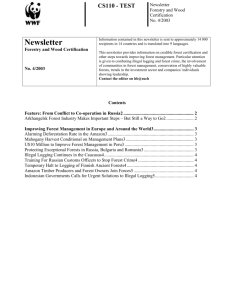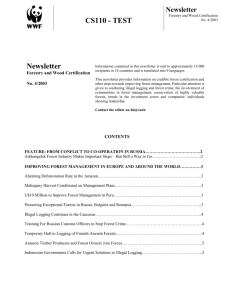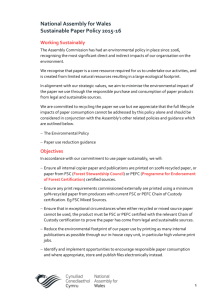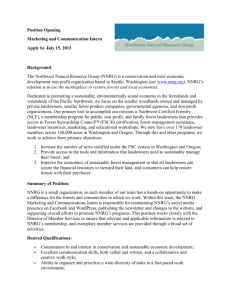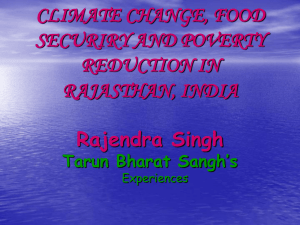Newsletter Forestry and Wood Certification
advertisement
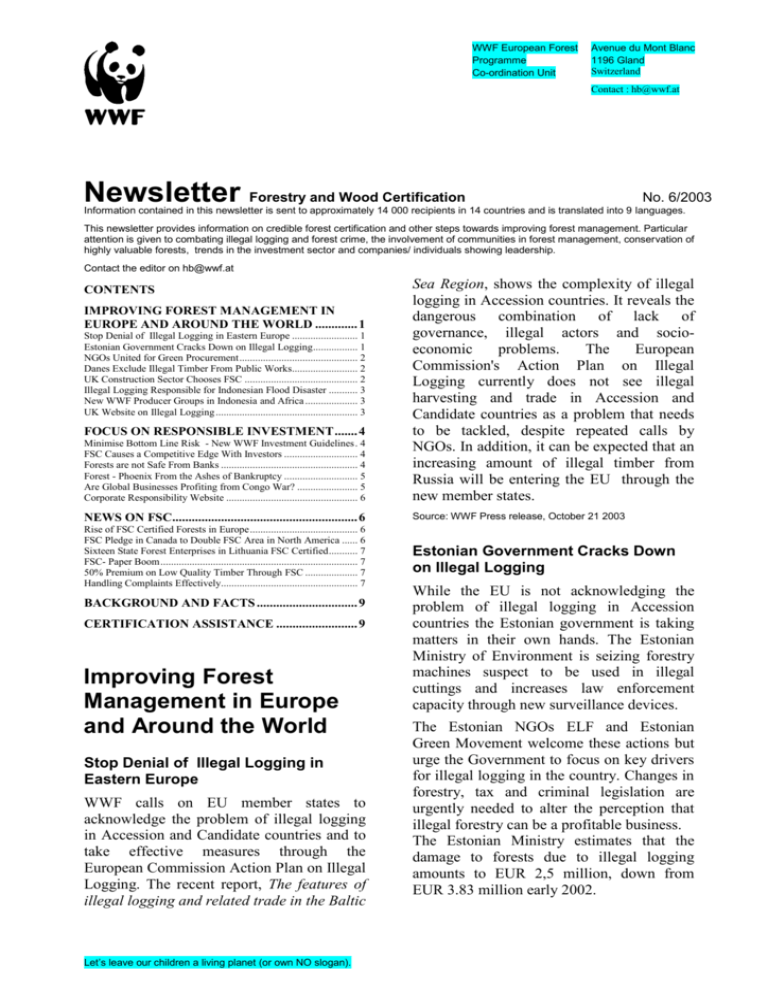
WWF European Forest Programme Co-ordination Unit Avenue du Mont Blanc 1196 Gland Switzerland Contact : hb@wwf.at Newsletter Forestry and Wood Certification No. 6/2003 Information contained in this newsletter is sent to approximately 14 000 recipients in 14 countries and is translated into 9 languages. This newsletter provides information on credible forest certification and other steps towards improving forest management. Particular attention is given to combating illegal logging and forest crime, the involvement of communities in forest management, conservation of highly valuable forests, trends in the investment sector and companies/ individuals showing leadership. Contact the editor on hb@wwf.at Minimise Bottom Line Risk - New WWF Investment Guidelines . 4 FSC Causes a Competitive Edge With Investors ............................ 4 Forests are not Safe From Banks .................................................... 4 Forest - Phoenix From the Ashes of Bankruptcy ............................ 5 Are Global Businesses Profiting from Congo War? ....................... 5 Corporate Responsibility Website .................................................. 6 Sea Region, shows the complexity of illegal logging in Accession countries. It reveals the dangerous combination of lack of governance, illegal actors and socioeconomic problems. The European Commission's Action Plan on Illegal Logging currently does not see illegal harvesting and trade in Accession and Candidate countries as a problem that needs to be tackled, despite repeated calls by NGOs. In addition, it can be expected that an increasing amount of illegal timber from Russia will be entering the EU through the new member states. NEWS ON FSC......................................................... 6 Source: WWF Press release, October 21 2003 Rise of FSC Certified Forests in Europe ......................................... 6 FSC Pledge in Canada to Double FSC Area in North America ...... 6 Sixteen State Forest Enterprises in Lithuania FSC Certified ........... 7 FSC- Paper Boom ........................................................................... 7 50% Premium on Low Quality Timber Through FSC .................... 7 Handling Complaints Effectively.................................................... 7 Estonian Government Cracks Down on Illegal Logging CONTENTS IMPROVING FOREST MANAGEMENT IN EUROPE AND AROUND THE WORLD ............. 1 Stop Denial of Illegal Logging in Eastern Europe ......................... 1 Estonian Government Cracks Down on Illegal Logging ................. 1 NGOs United for Green Procurement ............................................. 2 Danes Exclude Illegal Timber From Public Works......................... 2 UK Construction Sector Chooses FSC ........................................... 2 Illegal Logging Responsible for Indonesian Flood Disaster ........... 3 New WWF Producer Groups in Indonesia and Africa .................... 3 UK Website on Illegal Logging ...................................................... 3 FOCUS ON RESPONSIBLE INVESTMENT ....... 4 BACKGROUND AND FACTS ............................... 9 CERTIFICATION ASSISTANCE ......................... 9 Improving Forest Management in Europe and Around the World Stop Denial of Illegal Logging in Eastern Europe WWF calls on EU member states to acknowledge the problem of illegal logging in Accession and Candidate countries and to take effective measures through the European Commission Action Plan on Illegal Logging. The recent report, The features of illegal logging and related trade in the Baltic Let’s leave our children a living planet (or own NO slogan). While the EU is not acknowledging the problem of illegal logging in Accession countries the Estonian government is taking matters in their own hands. The Estonian Ministry of Environment is seizing forestry machines suspect to be used in illegal cuttings and increases law enforcement capacity through new surveillance devices. The Estonian NGOs ELF and Estonian Green Movement welcome these actions but urge the Government to focus on key drivers for illegal logging in the country. Changes in forestry, tax and criminal legislation are urgently needed to alter the perception that illegal forestry can be a profitable business. The Estonian Ministry estimates that the damage to forests due to illegal logging amounts to EUR 2,5 million, down from EUR 3.83 million early 2002. Newsletter Forestry and Wood Certification No. 6 (December)– 2003 Sources: Baltic News Service November 14 2003; Joint NGO Press release on the EU action plan against illegal logging; ELF and Estonian Green Movement November 2003 www.panda.org/about_wwf/where_we_work/europe/news/ne ws.cfm?uNewsID=9277 NGOs United for Green Procurement In October a coalition of 14 NGOs sent a strong message to the EU to urgently progress on green and social procurement. Public authorities must be allowed to take environmental and social criteria, as well as equality, into account when awarding their public contracts. Despite strong support by the European Parliament and a recent positive ruling by the European court of Justice, the Council continues to block municipalities and other public authorities that seek to award public contracts in a more ethical manner. “The Council makes a farce of democracy by ignoring the demands of the municipalities and most significantly the cross-party demand of the European Parliament,” says Jan Willem Goudriaan, Deputy General Secretary of the European Federation of Public Service Unions speaking on behalf of the Coalition for Green and Social Procurement and organisations representing municipalities. The NGO coalition consists of WWF, EEB, EPSU, Association of European Consumers, Social Platform, European Disability Forum, Greenpeace, Solidar, Oxfam, Climate Alliance, CAN Europe, EUROCITIES, Fairtrade and the UK Clean Clothes Campaign. Source: NGO coalition paper October 2003 http://www.panda.org/news_facts/publications/forests/index.cf m Excluding Illegal Timber From Public Works The Danish Ministry of the Environment recently published a timber purchasing guide which helps public and semi- public Let’s leave our children a living planet (or own NO slogan). institutions to ensure the tropical timber they purchase is produced in a legal and sustainable manner. The guide concludes that “at present the easiest way to obtain legally and sustainably produced tropical timber is by means of an FSC certificate”. The guide is however voluntary and requires implementation. “WWF welcomes that the Danish government takes a first step to exclude illegal and controversial timber from their public works”, said Duncan Pollard, Head of the WWF European Forest Programme. “We continue to urge the EU to approve green procurement in their new directives and hope that other countries will take matters in their own hands like Denmark.” The Danish guide gives some credit to the certification system MTCC on legality issues however notes that MTCC is not yet a guarantee for sustainable forest management. “Currently only FSC gives buyers a choice to buy from legal and well managed sources”, said Duncan Pollard. “Other systems do not meet the required criteria. MTCC certified timber for instance currently does not guarantee environmentally, socially and economically sustainable forest management and is still missing important steps to verify legal compliance.” Access the procurement guide http://www.sns.dk/udgivelser/2003/tropical/default.htm on UK Construction Sector Chooses FSC On November 11 UCATT (Britain's construction workers' union) and Greenpeace launched a new initiative to exclude controversial timber from the UK construction sector. In the report The Case for Specifying Timber From Sustainable and Legal Sources the organisations make it clear that companies can only guarantee that 2 Newsletter Forestry and Wood Certification No. 6 (December)– 2003 timber used in their projects is from well managed forests by purchasing timber certified by the Forest Stewardship Council (FSC). The report will be distributed to UCATT members, contractors, local authorities, housing associations and property developers. The UK is currently the largest importer of illegal tropical timber in Europe, with approximately 60% of all UK tropical timber imports coming from illegal logging operations in some of the world's most important rainforests, including the Amazon, Indonesia and Central Africa. The construction industry uses approximately 70% of all the timber sold by the UK timber industry. Central Government contracts account for 15% of UK timber use, and the public sector as a whole accounts for 40%. George Brumwell, UCATT General Secretary, said 'The construction industry is often criticised for its approach to the use of natural resources. This initiative is an opportunity to silence those critics and prove that everyone within the industry can contribute to sustainable development.” Sources: Editorial, Timber Trades Journal, November 15 2003; Press Release Greenpeace, UCATT November 10 2003 Illegal Logging Responsible for Indonesian Flood Disaster The devastating flood in Indonesia beginning of November which left more than 200 people dead or feared killed is largely due to the rampant logging in Sumatra's forests, according to environmental groups and government officials. "At least 85 percent of the floods and landslides in Indonesia are caused by illegal logging", said Longgena Ginting, Executive Director of Walhi, Indonesia's largest environmental group. Let’s leave our children a living planet (or own NO slogan). Unchecked logging disrupts the natural absorption and flow of rainwater from the highlands, triggering floods and landslides that sweep into the valleys. Indonesia struggles to stop forest crime which devastates the country. 8 trees out of 10 are cut illegally. Indonesia has already lost 75% of its forests. Sources: Associated Press; Environmental News Network November 5 2003; TTJ November 7 2003 New WWF Producer Groups in Indonesia and Africa WWF has recently formed Producers Groups for West and Central Africa as well as Indonesia, offering a framework for committed logging companies to progress towards certification. By setting up Producer Groups WWF offers incentives for timber producers around the world to progress to environmentally, socially, and economically sustainable forestry practices. Any company may be eligible to join, provided they have a clear and timebound action plan to show how they intend to progress towards credible forest certification. Progress against this action plan will be periodically monitored, using independent third party auditors. Indonesian and African producers are facing increasing scrutiny to demonstrate to buyers that the products they are offering are legal and progressing towards certification. Producer Groups are part of the WWF Global Forest and Trade Network. Source: Global Forest and Trade Network October 2003 For more information go to www.panda.org/forestandtrade UK Website on Illegal Logging The Sustainable Development Programme of the Royal Institute of International Affairs in London, has developed a website which covers all aspects of illegal logging. The 3 Newsletter Forestry and Wood Certification No. 6 (December)– 2003 informative site describes current political processes, case studies and recent news on illegal logging from around the world. Visit http://www.illegal-logging.info Focus on Responsible Investment Minimise Bottom Line Risk - New WWF Investment Guidelines WWF has produced investment guidelines to assist financial institutions to minimise their bottom line and reputational risk when investing in forest, mining and agricultural projects around the world. This new focus results from a mounting recognition of environmental and financial risks through the financing of projects impacting forests e.g. pulp and paper mills, palm oil plantations, mines and dams. In October WWF, the World Bank and the World Business Council for Sustainable Development hosted a Forest Investment Forum in Washington DC which brought together nearly 150 Senior Executives of globally significant forest product companies, development and commercial banks and other financial institutions as well as leading conservation agencies. In this conference a need for investment safeguards was agreed, both as an incentive to responsible investment and a deterrent to unsustainable and destructive activities. WWF will work with financial institutions (commercial banks, development banks, export credit agencies), forest companies, governments and others to agree a process to further develop and implement these investment policies to protect forests and local communities. Let’s leave our children a living planet (or own NO slogan). Source: WWF International October 2003 For a copy of the investment guidelines go to http://www.panda.org/downloads/forests/wwfinvestmentpol7o ct03final.doc FSC Causes a Competitive Edge With Investors Innovest - a New York based leading environmental finance advisory firm - has improved the rating of North America's largest producer of paper and other wood products, Domtar, from BBB to A, due to its recent decision to seek certification for all of its forests and mills according to FSC standards. Innovest states that companies like Domtar who seek FSC certification and co-operation with NGOs are gaining a competitive edge. “Major global institutional investors increasingly recognise commitments such as Domtar´s as a differentiating factor, demonstrating the business case for beyond compliance environmental and social initiatives”. According to Innovest companies receiving their top ranking in the forestry sector have outperformed others by 43% over the last 4 years. “Innovests rating have shown that sector leaders are becoming more aware of the link between environmental performance and the bottom line, leveraging this to reduce the cost of capital, risk exposure and to improve reputation.” Source: Innovest Strategic Value Advisors, Upgrade Alert (NYSE/TSX: DTC) November 2003 Domtar Inc. www.innovestgroup.com Forests are not Safe From Banks WWF recently published a report which rates 11 German, Dutch and Swiss Banks according to their investment behaviour: the existence and implementation of environmental and social standards, and the 4 Newsletter Forestry and Wood Certification No. 6 (December)– 2003 transparency of their investment. The overall results show that many banks have no effective safeguards to prevent their money being used for forest destruction. The ranking and scoring of the banks from best to worst: 1. ABN Amro - Netherlands (B+); 2. DEG - Deutsche Investitions- und Entwicklungsgesellschaft - Germany (B+); 3. Hypo Vereinsbank - Germany (B+); 4. UBS – Switzerland (B-); 5. Kreditanstalt für Wiederaufbau – Germany (C+); 6. Dresdner Bank – Germany (C+); 7. Westdeutsche Landesbank Germany (C); 8. Commerzbank – Germany (C-); 9. Participation in the evaluation was refused by Deutsche Bank (Germany), IKB Deutsche Industriebank (Germany) and NORD/LB – Norddeutsche Landesbank (Germany) Since the 1990s all the surveyed banks had been subject to massive NGO criticism for their investment in the Indonesian pulp and paper and palmoil sector. ABN AMRO from the Netherlands has developed environmental policies together with NGOs and in this could serve as an example to others. Source: WWF Press release November 20 2003 Download the German report from http://www.panda.org/downloads/forests/bankenrating.pdf Forest - Phoenix From the Ashes of Bankruptcy Following the bankruptcy of the forest company Bosques S.A. nearly 60.000 hectares of temperate rainforest in Southern Chile will be protected with the help of a bank. FleetBoston Financial Corporation, the Let’s leave our children a living planet (or own NO slogan). largest creditor of Bosques S.A., assisted a Chilean conservation group to purchase the forest property in public auction for conservation purposes. "By partnering with The Nature Conservancy we were able to construct a unique transaction that reflects our corporate values and fulfils our financial responsibilities to our shareholders, while preserving an ecologically-critical area in Chile," said Chad Gifford, chairman and CEO of FleetBoston Financial Corporation. The Valdivian Coastal Range is one of only five temperate rainforests on Earth. When FleetBoston learned of the significance of this forest, they made a corporate decision to balance their interests as a creditor with their commitment to be environmentally and socially responsible. The acquisition is part of a larger partnership between The Nature Conservancy, WWF, the Global Conservation Fund of Conservation International and local organizations in Chile. Source: Press Release WWF US November 6 2003 Are Global Businesses Profiting from Congo War? Major international human rights and development groups are alarmed at the possible involvement of multinational corporations in plundering Congo's natural resources during the five-year conflict that has caused the deaths of more than three million people. A dozen groups - among them Human Rights Watch (HRW), Friends of the Earth (FoE), Oxfam, and the International Human Rights Law Group called on the UN Security Council late October to press the United States and other Western Governments to launch immediate investigations into the involvement of multinational corporations based in their countries. In January 2003 the Security 5 Newsletter Forestry and Wood Certification No. 6 (December)– 2003 Council approved a resolution strongly condemning the illegal exploitation of natural resources in the Democratic Republic of Congo and demanding that all governments act immediately to end those abuses. Source: Common Dreams Newsroom October 28 2003 http://www.commondreams.org/headlines03/1028-07.htm Corporate Responsibility Website Quantitative evidence on how corporate responsibility can improve financial bottom line can be found on the new website Conversations with Disbelievers. This website presents practitioners with an array of data in the form of case studies and special reports and is designed to be used by business managers, non-profit leaders, consultants and public policy makers. The site has been created by university institutes, business organisations, marketing experts, WWF and other NGOs dealing with Corporate Citizenship in India, Africa, Europe and America. Access the website on http://www.conversations-withdisbelievers.net/site/ News on FSC Rise of FSC Certified Forests in Europe Globally the amount of FSC certified forests has risen by close to 29% from June 2002 to November 2003, from 28.5 million hectares to 40 million hectares. The biggest increase of all continents has occurred in Europe where the FSC certified forest area rose from 18.6 to 25.17 million hectares. The most important increases in FSC certified area Let’s leave our children a living planet (or own NO slogan). since June 2002 occurred in Croatia, Latvia, Lithuania, Poland and Russia. Source: FSC International November 2003 FSC Pledge in Canada to Double FSC Area in North America Domtar, one of North America's largest producers of paper and other wood products has agreed to seek certification all of its forests and mills according to FSC standards. Domtar manages nearly 9 million hectares of forests in Canada. Successful certification would therefore more than double the amount of FSC certified forests in North Amercia. Domtar is the third-largest producer of uncoated freesheet paper. It is also a leading manufacturer of business papers, commercial printing and publication papers, and technical and specialty papers. "Environmentally conscious consumers demand a choice. They want paper that includes virgin fibre content, but they also want reassurance that this content comes from well-managed, sustainable forests. These same concerns for forest management also apply to forest products," said Raymond Royer, President and CEO of Domtar. "By adhering to a standard that respects the values of all forest users, including the First Nations, we believe that the public, governments, customers, and investors will also see it as a serious commitment to ensure the sustainability of our operations". By certifying all its forest operations and mills to FSC standards, Domtar will be in a position to significantly expand its existing line of FSC certified products. Source: 2003 Press Release WWF and Domtar, November 14 6 Newsletter Forestry and Wood Certification No. 6 (December)– 2003 Sixteen State Forest Enterprises in Lithuania FSC Certified than 40% over the past 10 years and this trend will continue. FSC certificates over 375.000 hectares of Lithuanian state forests were recently granted. The FSC certification process of Lithuania's state forests had started in 2001. By now 16 state forest enterprises have been certified and can sell FSC certified wood. "FSC certification means acknowledgement of responsible forest management in our forest enterprises", commented Benjaminas Sakalauskas, Director General of Lithuania´s General Forest Enterprise (GFE). Forested land in Lithuania comprises about 2 million hectares, approximately 31% of the entire country. State forests account for nearly half of the country's forest area. Sources: SCA, Dalum, Drewsen and Klippan (Inveresk) October 2003; FSC databases www.fsc-info.org October 2003; CEPI 2002; Ratgeber Papier WWF and Bundesamt für Umwelt, Wald und Landschaft Switzerland 2001) Source: NEPcon; FSC News and Notes 17/ November 3 2003 FSC- Paper Boom FSC paper production in Europe has quadrupled since the beginning of 2003. This was the result of an enquiry to major European paper producers: SCA, Dalum, Drewsen and Klippan (Inveresk). The booming development, combined with a worldwide increase of FSC certifications in the paper and print sector marks a promising shift. The number of FSC certified companies in the paper and print sector worldwide has doubled since the beginning of the year and now amounts to 129. Most significant was the increase in Japan where the number of FSC certified companies in the paper industry has risen from 1 in 2000 to 58 in 2003. Worldwide 17% of timber used for paper production are estimated to stem from virgin forests. The production of paper and board in Western Europe alone has increased by more Let’s leave our children a living planet (or own NO slogan). For a list of FSC certified paper producers, printers and wholesalers in Europe go to http://www.panda.org/downloads/forests/fscpaperguide.pdf 50% Premium on Low Quality Timber Through FSC Two forest owners reported recently to WWF Austria that they are very happy with their decision to FSC certify their forests as it has already paid off financially. Both forest owners were able to add value to low quality timber through FSC and sell it to a market niche at an astounding 50% increased premium. Although these may be unique and not statistically representative cases they show the potential FSC is generating on the market. Source: WWF Austria June and October 2003 Handling Complaints Effectively A new summary of FSCs complaints handling system is now available. The FSC complaints and dispute resolution system is divided in four levels for resolving complaints: resolving a complaint, resolving a dispute, formal dispute resolution and accreditation appeals. What you should do in what situation and who to talk to is explained in practical detail. Access the summary on www.fscoax.org under Communications Center/ Factsheets. FSC Data Easily Accessible The WCMC/UNEP/FSC/WWF website with key statistics on FSC is now accessible on http://www.certified-forests.org It features among other statistics global and 7 Newsletter Forestry and Wood Certification No. 6 (December)– 2003 regional maps as well as background information on FSC certification. Let’s leave our children a living planet (or own NO slogan). 8 Newsletter Forestry and Wood Certification No. 6 (December)– 2003 Background and Facts The Forest Stewardship Council is currently the only credible timber certification system supported by leading environmental and social NGOs. The FSC label makes it possible for buyers to choose forest products that come from forests managed to the highest environmental and social standards and from legal sources. As global system FSC offers market incentives for improving forest management around the world. Key Statistics Status: November 2003 Total area of FSC certified forests: 39,865,959 hectares Number of countries with FSC forests: 57 Number of countries with COC and FM/ COC certificates: 69 FM certificates: 560 COC certificates: 2759 For regional maps and data on certified areas in Europe, Africa, Asia – Pacific, Latin America and North America go to http://www.certified-forests.org Programme Information For Information on the Forest Stewardship Council (FSC) www.fscoax.org Global Forest And Trade Network www.panda.org/forestandtrade Forests For Life Programme, WWF www.panda.org/forests4life Certification Basics An Introduction to Forest Certification: (2001) http://www.proforest.net/objects/introtocert.pdf NGO Positions on Certification Systems Behind the logo (2001) -In-depth report of the four biggest forest certification schemes (CSA, FSC, PEFC & SFI) analyses the strengths and weaknesses of each scheme and aims to provide companies, governments and NGOs with the facts needed for informed decision making. http://www.fern.org/pubs/reports/behind/btlrep.pdf Make Your Own Judgement About Certification Schemes Assessing Forest Certification: A Practical Guide : (2002) http://www.proforest.net/objects/Assessing%20Forest %20Certification/assessing%20schemes.pdf Certification Assistance Where to Sell and Buy Certified Timber Chain of Custody and Forest Managem ent Certificates - increase in 2003 4000 3000 2000 1000 0 Nov.03 Jan. 03 COC and FM/ COC COC FM Global search for FSC certified timber and products: www.certifiedwood.org: This database allows you to search by type of timber and timber species, by product type and supply chain position and country. On www.fsc-info.org. you can search for FSC certified species all over the world. Search mechanism include species ( open query) , tenure and country. Global search for FSC Forest Management and Let’s leave our children a living planet (or own NO slogan). 9 Newsletter Forestry and Wood Certification No. 6 (December)– 2003 Chain of Custody certificate holders www.fsc-info.org. On www.certifiedwood.org you certification status of a company can confirm Global search for FSC certified forests: www.certifiedwood.org The advantage of this certified forest list is the contact details like telephone numbers are included. Most up to date information on which forests and which companies are certified can be found on the main FSC International website www.fscoax.org however here information is mainly aimed at providing an overview rather than to help establish contact. Check approved FSC certifiers on www.fscoax.org Assistance With Group Certification Group Certification Toolkit (2001) Procedures, guidance notes, forms and instructions for use on how to set up an FSC approved Group Certification Scheme. For use by forest managers, forest owners, co-operatives, communities and harvesting companies. www.cmnet.org (case studies group certification) To learn from the experiences of other companies who are already part of the network get in touch with one of the forest and trade network co-ordinators. Contact details can be found on http://www.panda.org/forestandtrade/ Further Contacts for Assistance With Certification For assistance on Procurement and Supply Chain Development, FSC Chain of Custody – Implementation contact http://www.forwoodinternational.com Multiple Solutions for the World´s Forests by WWF WWF works on forest conservation through a multiplicity of approaches and strategies which are pursued together with regional and global partners: Credible Forest Certification, High Conservation Value Forests, combating illegal logging and forest crime, preventing forest fires, restoring damaged and degraded forests and forest protection. WWF's Forests for Life Programme has developed position papers on global forest issues which are available on http://www.panda.org/about_wwf/what_we_do/forests/what_we_do /policy_events/index.cfm A Practical Guide to Developing a Group Scheme for FSC-Accredited Certification of Forests: Final Draft (2001) http://www.proforest.net/objects/gscheme2.pdf Learning From Others 500 companies are part of the WWF co-ordinated Global Forest and Trade Network (GFTN), committed to responsible forest management and trade. They represent a wide range of actors including forest owners, timber processors, construction companies, retailers, investment agencies and local authorities. Members vary from small family-owned businesses to world scale leading companies such as IKEA and the Home Depot. They are committed to gradually producing, trading and/or sourcing independently certified forest products. Find more information about GFTN at: http://www.panda.org/forestandtrade/ Let’s leave our children a living planet (or own NO slogan). The World Bank/ WWF Alliance was formed in 1998 and draws on the comparative institutional strengths of the partner institutions: the Bank's access to policy dialogue, convening power, analytical capacity and financing operations, WWF's strong field presence, private sector partnerships, public trust and forest conservation expertise. By combining the strengths of the Bank and WWF, and their partners, the Alliance is uniquely positioned to effect changes in forest policy and practices, to help safeguard biodiversity, and alleviate poverty. With forests being depleted globally at a rate of 28 hectares per minute, the stakes are high. Urgent, significant and coordinated actions on a global scale 10 Newsletter Forestry and Wood Certification No. 6 (December)– 2003 are needed to arrest the precipitous and relentless declines in forest cover, the concomitant loss of biodiversity, and the effects on the livelihoods of forest-dependent people. For more information on the World Bank/ WWF Alliance go to www.forest-alliance.org For further information please contact (contact address of NO) Let’s leave our children a living planet (or own NO slogan). 11
